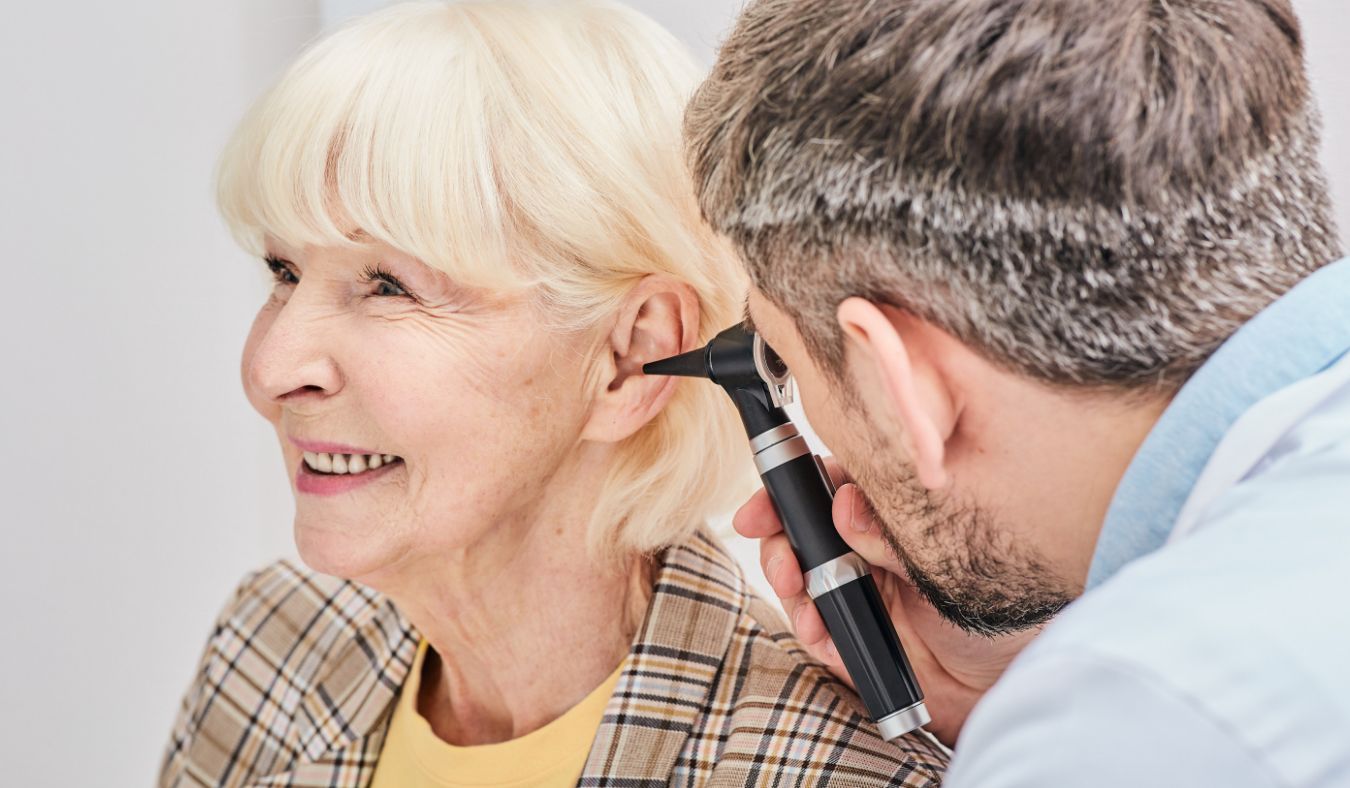Why Early Detection of Hearing Issues Matters
Hearing loss usually doesn’t announce itself. It develops slowly,

By: admin | June 20, 2025
Tinnitus is commonly described as a ringing, buzzing or hissing sound that doesn’t come from any external source. For some, it can be a mild annoyance, while for others, it can interfere with concentration or sleep. Although the cause of tinnitus isn’t always known, it’s often connected to hearing loss, which is why hearing aids are sometimes considered as part of the treatment process.
Hearing aids are typically used to improve hearing, but they’ve also been found to help reduce the impact of tinnitus for certain individuals. These devices can make everyday sounds more noticeable, which may help shift attention away from the internal noise. While hearing aids don’t cure tinnitus, they are a common part of many tinnitus management plans. If you’re exploring treatment options, it’s worth understanding how they might fit into your care.
Tinnitus is the experience of hearing sounds that aren’t coming from an outside source. These sounds are usually described as ringing, buzzing, hissing or clicking, and they can vary in pitch and intensity. There are different types of tinnitus. The most common is subjective tinnitus, which only the person experiencing it can hear. Less commonly, there’s objective tinnitus, where the sound can sometimes be heard by a professional during an exam, usually caused by an issue with blood flow or muscle movement near the ear. Tinnitus isn’t a condition on its own – it’s a symptom of something else, like hearing loss, ear injury or even high blood pressure. Because it can show up in different ways and for different reasons, understanding the type of tinnitus someone has is an important step in figuring out how to manage it.
Diagnosing tinnitus usually starts with a visit to an audiologist, who will ask about your symptoms, medical history and any situations that make the sounds better or worse. Because tinnitus is a symptom – not a condition itself – the goal is to find out what might be causing it. A hearing test is often the first step. This helps show whether hearing loss is involved, which is common in many tinnitus cases. Depending on what’s found, an audiologist might also check for issues like earwax buildup, signs of ear injury or other health problems that could be related. Getting a proper diagnosis is important because it helps guide the next steps in managing tinnitus.
When our hearing is functioning normally, sound waves enter our ears and are sent into signals that our brain can interpret. However, any damage or blockage in this process could result in tinnitus. The primary cause of tinnitus is often related to damage within the inner ear – specifically to the tiny hair cells that capture sound waves and convert them into nerve signals. These hair cells can be damaged due to aging, exposure to loud noises, certain medications or health conditions. When these hair cells are compromised, they might send random electrical impulses to your brain, causing you to hear sounds that aren’t really there.
Another common cause of tinnitus is Meniere’s disease, a disorder that affects your inner ear and can lead to episodes of vertigo, hearing loss and tinnitus. Other factors like high blood pressure or a buildup of earwax can also contribute to tinnitus.
While it’s important for you to understand these potential causes behind your symptoms, keep in mind that everyone is different – what triggers one person’s tinnitus might not affect another in the same way. That’s why it’s important for you to consult with an audiologist who can provide personalized advice based on your specific circumstances.
Tinnitus can have a noticeable effect on your daily routine, especially when it comes to sleep. Many people find that the ringing or buzzing in their ears feels louder at night when everything else is quiet. This can make it hard to fall asleep or stay asleep, leading to fatigue and trouble focusing during the day. Over time, poor sleep can start to affect your mood, energy levels and overall well-being, making it harder to keep up with daily responsibilities.
Tinnitus can also make social situations more challenging. In noisy environments like restaurants or family gatherings, it may be harder to follow conversations – especially if you are experiencing hearing loss. You might find yourself withdrawing from group settings or avoiding social events altogether. This can lead to feelings of isolation or frustration. While tinnitus affects everyone differently, these disruptions to daily life are common and can build up over time, which is why finding ways to reduce your symptoms is so important.
Hearing aids are advanced tools used to support better hearing and communication. They’re carefully designed to help people hear more clearly in everyday situations. But what exactly do they do, and how do they work? All hearing aids have three main components: a microphone, an amplifier and a speaker. The microphone picks up sounds from your environment and converts them into electrical signals. These signals are then boosted by the amplifier to make them louder. Finally, these amplified signals are sent to the speaker, which converts them back into sound waves that you can hear. This process happens almost instantly, allowing you to hear sounds more clearly and at a volume that is comfortable for you.
When it comes to tinnitus treatment, there are a variety of hearing aid options available. Each one has its unique features and benefits, offering a range of possibilities for individuals dealing with tinnitus.
Choosing the right hearing aid is a personal decision based on individual needs and preferences. It’s important to consult with an audiologist who can guide you through this process and help you find a solution that works best for you. With their assistance, you’ll be well-equipped to manage your tinnitus effectively.
Modern hearing aids come with a range of features designed to improve how you hear in different environments. At their core, they amplify sounds to help with hearing loss, but today’s devices go beyond just making things louder. Many models can automatically adjust to background noise, making it easier to focus on conversations in busy places like restaurants or social gatherings. Some hearing aids also connect to smartphones or other devices through Bluetooth, letting you stream phone calls, music or videos directly to your ears.
For people who also experience tinnitus, many hearing aids include a tinnitus masking feature. This function plays soft, soothing sounds – like white noise or gentle tones – that help distract the brain from the internal ringing or buzzing caused by tinnitus. By combining sound amplification with these masking features, hearing aids can make it easier to manage both hearing loss and tinnitus at the same time. While this doesn’t cure tinnitus, it can make daily life more manageable by reducing how noticeable the symptoms feel.
Managing tinnitus symptoms can sometimes involve wearing hearing aids and choosing the right one can play a role in how it can reduce your symptoms of tinnitus. With many models and features to consider, the process can feel challenging. Taking time to understand your specific needs and working with an audiologist can help you identify a device that fits your situation.
Firstly, consider what features are most important to you. If you often find yourself in noisy environments, for example, you might benefit from a hearing aid with advanced noise reduction capabilities. On the other hand, if your tinnitus is more noticeable in quiet situations, a device with built-in sound therapy options could be helpful. Next, think about comfort and style. Hearing aids come in various designs – from models that sit behind the ear to those that fit directly into the ear canal. The right choice for you depends on factors like the severity of your hearing loss and personal preference.
Lastly, consider how easy the device is to use. Modern hearing aids often come with user-friendly features like rechargeable batteries or wireless connectivity for streaming audio from smartphones or TVs. Selecting the perfect hearing aid involves understanding your unique needs and preferences while working closely with an audiologist who can guide you through this process. By doing so, you’re taking an important step towards managing your tinnitus effectively and enhancing your overall life quality.
Taking steps to better understand your hearing and explore options for managing tinnitus is an important part of maintaining your overall well-being. If hearing aids are part of the conversation, it can be helpful to learn what they offer and how they might fit into your daily routine. Regular exercise can improve circulation and overall health, which may benefit your ears and hearing. A balanced diet, rich in nutrients, can also support healthy hearing and help reduce the risk of hearing problems. Early detection is key – catching hearing loss or tinnitus early helps you to find the right treatment for your specific needs and prevent further issues. Regular check-ups with an audiologist can help identify any changes in your hearing health, making it easier to address concerns before they become an issue. These small steps can make a big difference in maintaining your hearing well-being over time.
Treating tinnitus and taking care of your hearing health can take time and planning, but support and resources are available. As hearing aid technology continues to improve and more is understood about tinnitus, there are options that may help reduce symptoms and support your overall well-being. If you’re curious about how hearing aids might help with your tinnitus or have any questions about your hearing health, at Huntington Hearing Solutions we are here to help. We’re here to guide you through every step of the process. You can contact our Pasadena location at (626) 361-4301 for more information.
Taking the first step toward better hearing health can take some thought, but it’s an important part of addressing tinnitus and related concerns. If you’re ready to learn more about your options, we are here to help. With the right support and tools, you can reduce your symptoms and improve your quality of life.
Tags: hearing aid features, hearing aid products, tinnitus management

Hearing loss usually doesn’t announce itself. It develops slowly,
By: admin | December 21, 2025

When you arrive for your hearing test, you can expect a straightforward
By: admin | September 3, 2025

Tinnitus is commonly described as a ringing, buzzing or hissing sound that
By: admin | June 20, 2025
